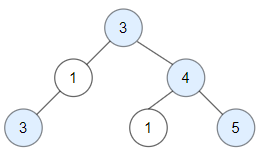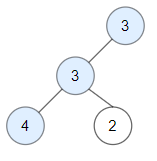树
深度优先搜索
广度优先搜索
二叉树
题目描述
给你一棵根为 root 的二叉树,请你返回二叉树中好节点的数目。
「好节点」X 定义为:从根到该节点 X 所经过的节点中,没有任何节点的值大于 X 的值。
示例 1:
输入: root = [3,1,4,3,null,1,5]
输出: 4
解释: 图中蓝色节点为好节点。
根节点 (3) 永远是个好节点。
节点 4 -> (3,4) 是路径中的最大值。
节点 5 -> (3,4,5) 是路径中的最大值。
节点 3 -> (3,1,3) 是路径中的最大值。示例 2:
输入: root = [3,3,null,4,2]
输出: 3
解释: 节点 2 -> (3, 3, 2) 不是好节点,因为 "3" 比它大。示例 3:
输入: root = [1]
输出: 1
解释: 根节点是好节点。
提示:
二叉树中节点数目范围是 [1, 10^5] 。
每个节点权值的范围是 [-10^4, 10^4] 。
解法
方法一:DFS
我们设计一个函数 $dfs(root, mx)$,表示从当前节点 $root$ 开始搜索好节点,其中 $mx$ 表示从根节点到当前节点的路径(不包括当前节点)上的最大值。
函数 $dfs(root, mx)$ 的执行逻辑如下:
如果 $root$ 为空,说明搜索结束,直接返回;
否则,我们判断 $root.val$ 与 $mx$ 的大小关系。如果 $mx \leq root.val$,说明 $root$ 是好节点,答案加一,并且我们需要更新 $mx$ 的值为 $root.val$。
接下来,我们递归调用 $dfs(root.left, mx)$ 和 $dfs(root.right, mx)$。
在主函数中,我们调用 $dfs(root, -10^6)$,其中 $-10^6$ 表示负无穷,因为题目中说明了每个节点权值的范围是 $[-10^4, 10^4]$,所以 $-10^6$ 肯定是一个比所有节点权值都小的值,这样就能保证 $dfs(root, -10^6)$ 一定会把根节点 $root$ 算作好节点。
时间复杂度 $O(n)$,空间复杂度 $O(n)$。其中 $n$ 是二叉树的节点数。
Python3 Java C++ Go TypeScript
1
2
3
4
5
6
7
8
9
10
11
12
13
14
15
16
17
18
19
20
21 # Definition for a binary tree node.
# class TreeNode:
# def __init__(self, val=0, left=None, right=None):
# self.val = val
# self.left = left
# self.right = right
class Solution :
def goodNodes ( self , root : TreeNode ) -> int :
def dfs ( root : TreeNode , mx : int ):
if root is None :
return
nonlocal ans
if mx <= root . val :
ans += 1
mx = root . val
dfs ( root . left , mx )
dfs ( root . right , mx )
ans = 0
dfs ( root , - 1000000 )
return ans
1
2
3
4
5
6
7
8
9
10
11
12
13
14
15
16
17
18
19
20
21
22
23
24
25
26
27
28
29
30
31
32
33
34
35 /**
* Definition for a binary tree node.
* public class TreeNode {
* int val;
* TreeNode left;
* TreeNode right;
* TreeNode() {}
* TreeNode(int val) { this.val = val; }
* TreeNode(int val, TreeNode left, TreeNode right) {
* this.val = val;
* this.left = left;
* this.right = right;
* }
* }
*/
class Solution {
private int ans = 0 ;
public int goodNodes ( TreeNode root ) {
dfs ( root , - 100000 );
return ans ;
}
private void dfs ( TreeNode root , int mx ) {
if ( root == null ) {
return ;
}
if ( mx <= root . val ) {
++ ans ;
mx = root . val ;
}
dfs ( root . left , mx );
dfs ( root . right , mx );
}
}
1
2
3
4
5
6
7
8
9
10
11
12
13
14
15
16
17
18
19
20
21
22
23
24
25
26
27
28
29
30 /**
* Definition for a binary tree node.
* struct TreeNode {
* int val;
* TreeNode *left;
* TreeNode *right;
* TreeNode() : val(0), left(nullptr), right(nullptr) {}
* TreeNode(int x) : val(x), left(nullptr), right(nullptr) {}
* TreeNode(int x, TreeNode *left, TreeNode *right) : val(x), left(left), right(right) {}
* };
*/
class Solution {
public :
int goodNodes ( TreeNode * root ) {
int ans = 0 ;
function < void ( TreeNode * , int ) > dfs = [ & ]( TreeNode * root , int mx ) {
if ( ! root ) {
return ;
}
if ( mx <= root -> val ) {
++ ans ;
mx = root -> val ;
}
dfs ( root -> left , mx );
dfs ( root -> right , mx );
};
dfs ( root , -1e6 );
return ans ;
}
};
1
2
3
4
5
6
7
8
9
10
11
12
13
14
15
16
17
18
19
20
21
22
23
24 /**
* Definition for a binary tree node.
* type TreeNode struct {
* Val int
* Left *TreeNode
* Right *TreeNode
* }
*/
func goodNodes ( root * TreeNode ) ( ans int ) {
var dfs func ( * TreeNode , int )
dfs = func ( root * TreeNode , mx int ) {
if root == nil {
return
}
if mx <= root . Val {
ans ++
mx = root . Val
}
dfs ( root . Left , mx )
dfs ( root . Right , mx )
}
dfs ( root , - 10001 )
return
}
1
2
3
4
5
6
7
8
9
10
11
12
13
14
15
16
17
18
19
20
21
22
23
24
25
26
27
28
29
30 /**
* Definition for a binary tree node.
* class TreeNode {
* val: number
* left: TreeNode | null
* right: TreeNode | null
* constructor(val?: number, left?: TreeNode | null, right?: TreeNode | null) {
* this.val = (val===undefined ? 0 : val)
* this.left = (left===undefined ? null : left)
* this.right = (right===undefined ? null : right)
* }
* }
*/
function goodNodes ( root : TreeNode | null ) : number {
let ans = 0 ;
const dfs = ( root : TreeNode | null , mx : number ) => {
if ( ! root ) {
return ;
}
if ( mx <= root . val ) {
++ ans ;
mx = root . val ;
}
dfs ( root . left , mx );
dfs ( root . right , mx );
};
dfs ( root , - 1e6 );
return ans ;
}
GitHub




